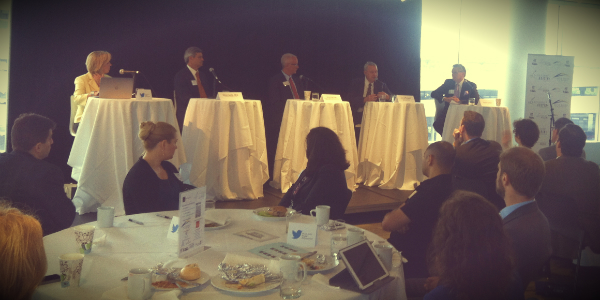
Guest post from 2013-14 Engage Breakfast Series guest blogger Alicia Dietrich. Alicia is a public affairs representative at the Harry Ransom Center at The University of Texas at Austin. See the end of this post for the podcast from the breakfast.
—–
In 2012, Travis County voters approved a measure to raise property taxes to support the founding of the Dell Medical School at The University of Texas at Austin. May’s Engage breakfast looked at the growth, innovation, and economic opportunities that this school will bring to Austin.
Panelists included Austin Mayor Lee Leffingwell; Steven Leslie, Special Assistant to the President for Medical Education at UT; and Greg Hartman, President of Academic Medicine, Research, and External Affairs for Seton Healthcare Family. The discussion was moderated by KXAN Anchor Robert Hadlock.
Key Takeaways From the Discussion
- This will be the first time in more than 35 years that a Tier I research university has opened a medical school, and Leslie and Hartman say this offers the chance to reshape medical curriculum for the future from the ground up.
- The hospital will help create a pipeline of doctors in Austin to help rectify a shortage here. It will also help create 15,000 jobs, 60 percent of which will be for high school degree holders for jobs in construction, data management, data analysis, home care, and more.
- Heath care of the future will be focused on efficiency, will leverage big data analysis to learn how to deliver the best care for patients, and will keep people healthy and out of expensive hospital beds. UT’s existing technology and expertise can help support this—for example, the supercomputer on campus is already being used to analyze large sets of data.
- UT worked for many years to put strong foundations in place for the medical school so that it could enhance and partner with existing programs in nursing, social work, public affairs, business, law, biotechnology, nanotechnology, engineering, computer programming, and more.
- Everyone—the City of Austin, UT, Seton, Travis County, et al—has a stake in the success of the medical school since all parties have invested resources into it. This community partnership approach was a key factor in making the medical school a reality, and continued collaboration between these partners is essential to making the school work and creating the envisioned Innovation District.
- Leffingwell spoke about the city’s vision for an Innovation District that will leverage the close proximity of experts in a variety of fields to create new discoveries, spur new technological breakthroughs, and improve the health of Austin’s population. He also spoke about how the medical school is a chance to revitalize the underdeveloped east side of downtown.
- Mass transit is going to be a key component to tie the district together. Hartman points out that density is key to innovation, but Austin will need to address transportation needs to avoid a gridlock situation that deters people from moving here.
–
Full Audio From the Event
Download this audio file (MP3)